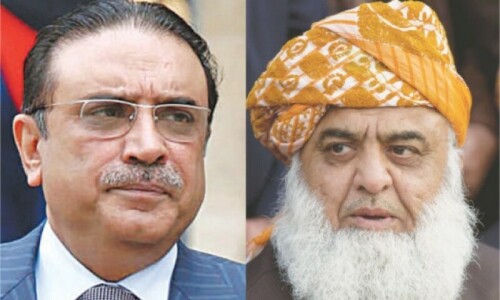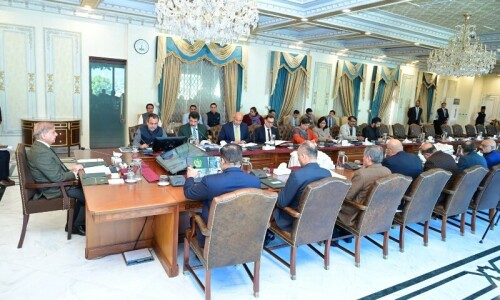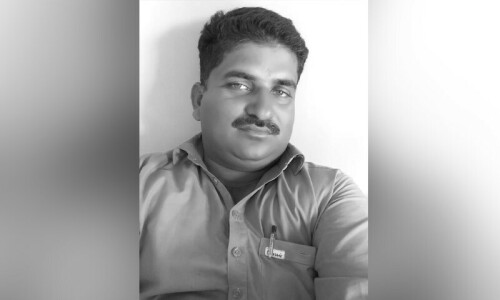
WHY would this sweet-natured girl with dark hair and Pakhtun features, who spoke clear Urdu without as much as a hint of a foreign accent, but whose English was heavily accented, be standing behind a counter of the Ministry of National Defence Republic of Poland during the International Defence Exhibition and Seminar (IDEAS) 2018?
Joanna Gornik noticed me before I saw her. “Wait, wait, I have something for you,” she said after seeing me juggle so many brochures. She pulled out a complementary green camouflage cloth bag from under the counter to put the stuff in. I thanked her and was about to walk off to the next stall as her’s seemed quite bare, without any weapons, plane or ship models, when I heard her speak with a Pakistani gentleman whom she was already busy in conversation with when I happened to pass by. She was speaking in fluent Urdu.
Turning around, I told her that I didn’t realise she was Pakistani. And she shook her head and smiled. “I’m not,” she replied.
How did she get to speak such great Urdu then? “I perfected my Urdu in 2013/2014 when I was in India for a year and studying at the University of Delhi,” she said, adding that she got interested in the language in Poland after listening to the poetry of Allama Iqbal, Faiz Ahmed Faiz and Parveen Shakir. “It was a poetry-reading session in my university class that made me fall in love with the verses, and want to learn Urdu,” she said.
“There is a course known as ‘Indology’ that is taught in four universities in Poland. There are two to three professors in each of these universities who teach Urdu. They also offer courses such as ‘Indian subcontinental literature and South Asian literature’,” she said.
Besides liking Iqbal, Faiz and Shakir, Joanna said that she also enjoyed reading Javed Akhtar. “I know he is not a Pakistani poet but he pens good Urdu poetry,” she said.
Asked if she would like to discover more Pakistani poets now that she was here, Joanna said that she would but she was travelling light with just a backpack, which didn’t allow her too much room to carry books. “While my colleagues pack up and return to Poland after IDEAS 2018, I intend to stay back for a little while longer and explore Pakistan. I want to travel to Multan, Lahore, Islamabad and Gilgit. I am here for the first time but definitely not the last,” she said.
She also added that she was looking forward to eating her favourite paratha, fried machhli, pilao and biryani while she was here. “I developed a taste for these delights thanks to Pakistani food restaurants in Poland,” she said.
About her future plans, though one would think that perhaps she would want to teach Urdu with the professors of Urdu at the universities she mentioned. Joanna only shook her head. “The Pakistani community in Poland is not that big for me to take advantage of my language skills there. I want to move to the UK and find a job as an interpreter there. There is a big need for interpreters there in hospitals as well as in the police, I hear,” she shared.
Suddenly we became conscious of an audience eavesdropping on our conversation. Three middle-aged women, all sisters, namely, Sana, Sophia and Nimra Adamjee, stood smiling. “You know, Iqbal, Faiz and Shakir are just names for most of our own people. Our young have no idea about the treasure-trove of poetry they have left behind. So it is a pleasure to be listening to this young lady from Poland who is so appreciative of our literature,” said one of them.
Meanwhile, Joanna, getting a little self-conscious, excused herself to get back to work.
In Hall 3, dedicated to China Defence, one ran into another Urdu-speaking individual, the shy Ding Zhichao, who liked punctuating all his sentences with the words “Inshallah” and “Mashallah.” Ding first said that he was “a retired major general of the Pakistan Army, Mashallah.” Then when it was pointed out to him that he was too young to be considered a retired officer in any army, he chuckled and diverted from the earlier narrative to say that he picked up Urdu during his three years in Islamabad. When asked what he was there for, he just shrugged and smiled.
Trying to make him talk more, one asked then if he worked with the China Electronics Technology Group. He was standing in their stall, after all. But the young man pointed to the stall right across and muttered something about being with the China State Shipbuilding Corporation.
Turning to see the other stall and turning back around to face him again was time enough for Ding to give one the slip!
Published in Dawn, December 2nd, 2018












































Dear visitor, the comments section is undergoing an overhaul and will return soon.